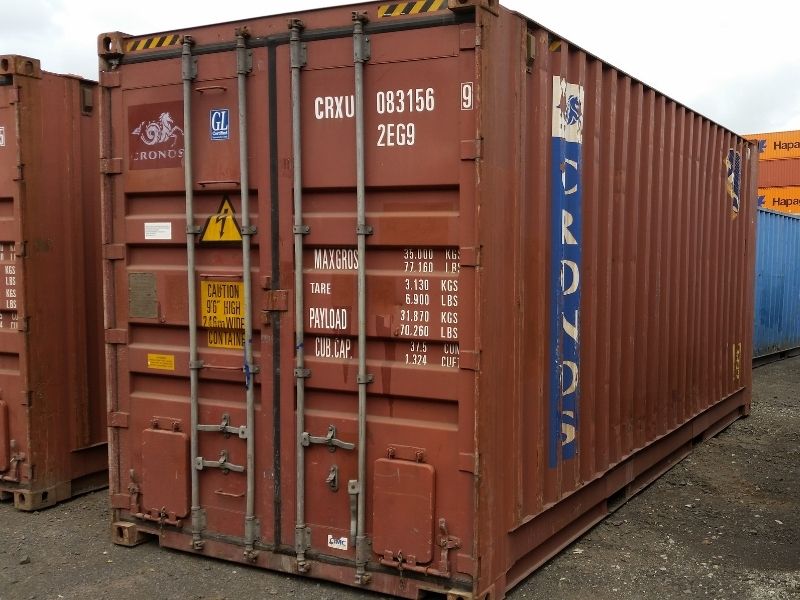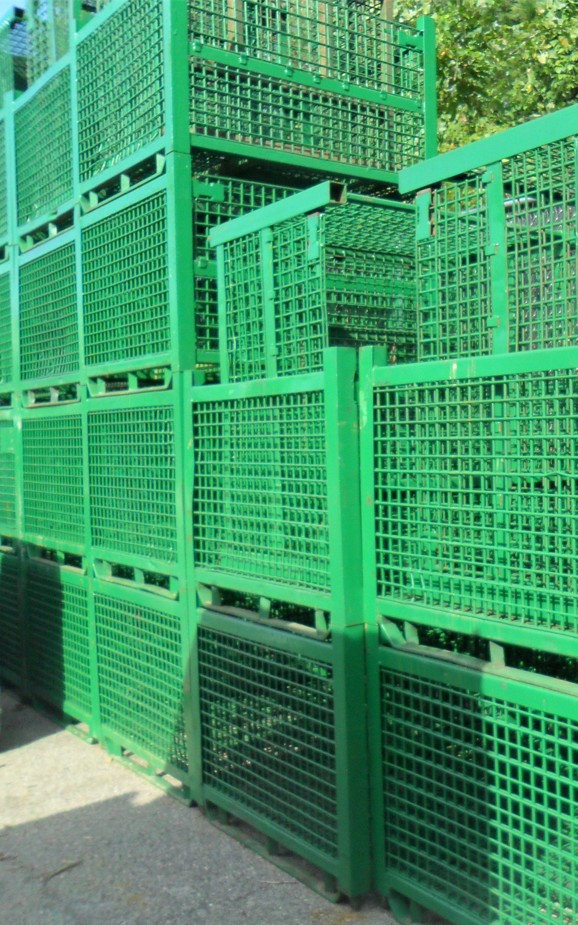The ultimate guide to used bulk containers for transporting goods safely
Wiki Article
The Ultimate Guide to Selecting the Right Bulk Containers for Your Organization Needs
Picking the suitable bulk containers is essential for any company that counts on reliable logistics. Various types of containers exist, each made for details materials and applications. Elements such as size, material compatibility, and governing standards play a substantial function in this decision-making procedure. Understanding these aspects can cause boosted functional efficiency. Lots of organizations ignore vital aspects that might boost their overall effectiveness and sustainability. What are these considerations?Understanding Different Types of Bulk Containers
Bulk containers function as essential tools for organizations seeking reliable storage space and transport remedies. These containers are available in numerous kinds, each designed to satisfy specific operational demands. One usual type is the intermediate mass container (IBC), which is excellent for granulated and fluid materials, providing a balance of ability and maneuverability. Another prominent alternative is the bulk bag, or FIBC, appropriate for completely dry, flowable products. These flexible containers are lightweight and can be quickly delivered and saved. For heavier materials, stiff mass containers are commonly used, giving resilience and stability for safe handling. In addition, there are specialized containers tailored for dangerous products, making sure conformity with security laws. Understanding the distinct attributes of these mass container kinds allows companies to make educated decisions that enhance logistics and decrease expenses. By selecting the appropriate container, business can boost their operational effectiveness and enhance their supply chain processes.Secret Product Considerations for Mass Containers
When picking bulk containers, it is vital to contemplate the products used in their construction. Factors such as toughness, sturdiness, and chemical compatibility play an essential role in ensuring the containers fulfill particular functional needs. In addition, weight and portability problems can impact both performance and transport logistics.Material Longevity and Toughness
Sturdiness and stamina are crucial elements in picking products for bulk containers, as they directly affect the container's ability to withstand different ecological conditions and taking care of procedures. Materials such as high-density polyethylene (HDPE), polypropylene, and stainless-steel are frequently favored for their robust residential properties, using resistance to abrasion, influence, and temperature variations. The option of material additionally impacts the overall life-span of the container; more powerful materials typically result in less regular substitutes, causing cost savings over time. Furthermore, the weight of the product can influence shipping prices and ease of handling. Businesses must consider their specific functional atmospheres and the potential for wear and tear to assure peak durability and strength in their bulk container selection.Chemical Compatibility Elements
Understanding chemical compatibility is essential for choosing bulk containers, as the products utilized need to stand up to the certain materials they will certainly hold. Different elements affect compatibility, consisting of the chemical nature of the components, temperature level, and duration of storage. For circumstances, harsh chemicals might require containers made from stainless steel or specialized plastics that withstand deterioration. Additionally, responsive materials can produce warmth or gases, necessitating vented or pressure-rated containers. The choice of container product, whether polyethylene, steel, or polycarbonate, need to line up with the chemical buildings of the stored materials to stop leaks or violations. Eventually, a detailed examination of these compatibility aspects assures safe handling and storage, securing both personnel and the setting while maintaining product honesty.Weight and Transportability Problems
Choosing bulk containers includes not only assessing chemical compatibility yet additionally considering weight and transportability. Businesses need to examine the convenience of handling and transport to enhance effectiveness. Lightweight products like high-density polyethylene (HDPE) or light weight aluminum can assist in much easier activity and reduce delivery prices. Conversely, much heavier containers might give enhanced resilience yet can hinder flexibility, specifically in atmospheres calling for regular moving. Furthermore, the design of the container ought to permit convenient lifting and stacking, guaranteeing ergonomic security for workers. Firms ought to likewise think about the infrastructure offered for transportation; for instance, containers compatible with forklifts or pallet jacks can streamline procedures. Inevitably, the ideal equilibrium between weight and mobility directly influences operational effectiveness and price efficiency.Sizing Your Bulk Containers for Ideal Performance
When sizing mass containers, companies should very carefully examine the measurements required to accommodate their details items. In addition, weight capability is an important aspect that influences performance and safety during transportation and storage space. Efficient sizing not just optimizes space but also optimizes functional workflows.Identifying Container Capacities
Picking the best dimensions for bulk containers is important for making best use of performance in storage and transportation. Businesses have to examine their particular needs, considering factors such as readily available area, the nature of the products being saved, and the techniques of YOURURL.com transport used. Accurate measurements guarantee that containers fit ideally in vehicles and stockrooms, decreasing thrown away area and decreasing taking care of time. Requirement dimensions can use convenience, yet personalized measurements may be required for one-of-a-kind needs or to fit specific products. Furthermore, it is very important to review stacking abilities and ease of access, as these elements affect total operational effectiveness. Ultimately, the ideal measurements cause boosted organization and streamlined logistics, profiting the total performance of the organization.Weight Capability Considerations
Comprehending weight ability is essential for services intending to optimize their mass container efficiency. The weight capability of a container straight impacts storage space capabilities, transportation logistics, and general operational expenses. Selecting containers with the suitable weight limitations assures that services can safely save and transport their items without risking damage or conformity issues. Overwhelming containers can result in architectural failings, while underutilizing capacity outcomes in lost resources. It is essential for services to analyze their item weights and consider any kind of regulative requirements when picking containers. Additionally, elements such as the kind of product, intended usage, and environmental conditions should likewise influence weight capability decisions. By examining these components, organizations can improve efficiency and ensure a structured supply chain.Governing Compliance and Safety Standards

Governing conformity and security criteria play an important role in the choice of bulk containers for services. Organizations should assure that their containers fulfill various guidelines set by local, national, and worldwide authorities. These standards typically pertain to material safety and security, architectural stability, and correct labeling, which aid prevent crashes and ensure the secure transport of items.
Additionally, adherence to industry-specific standards, such as those from the Food and Medicine Management (FDA) or the Occupational Safety and Wellness Management (OSHA), is essential for business taking care of hazardous materials or food. Non-compliance can cause fines, lawful problems, or damage to a business's track record.
Companies ought to additionally think about the container's compatibility with the materials being kept or carried to avoid contamination or chain reaction (used plastic containers). To summarize, comprehending and carrying out governing conformity and security standards is crucial for the reliable and liable usage of mass containers
Sustainability Options for Eco-Friendly Mass Containers

Firms are likewise checking out alternatives made from recycled products, which not only save sources but my site likewise sustain the recycling sector. Advancements in design permit for lighter containers that need much less power to transport, better improving sustainability. By incorporating these environmentally friendly mass container options, services can demonstrate their dedication to environmental stewardship while fulfilling customer demand for lasting methods. This change not only helps the earth however can likewise boost brand name track record and client commitment.
Cost-Effectiveness and Budgeting for Mass Containers
While several organizations concentrate on sustainability, cost-effectiveness remains a vital variable when selecting mass containers. Organizations must assess the first purchase price, as well as long-term functional prices, to guarantee monetary viability. Variables such as reusability, upkeep, and longevity play a considerable role in figuring out overall expenses.Buying high-quality containers might produce higher in advance costs but can result in cost savings through lowered replacement rates and reduced waste. In addition, companies need to think about transport expenses and storage effectiveness, as these can affect the general spending plan.

Frequently Asked Questions
How Do I Establish the Right Container for Hazardous Materials?
To establish the ideal container for dangerous products, one must evaluate compatibility with the material, consider the container's product, look for regulative conformity, and assess ability and safety and security features to assure proper handling and storage.Can Bulk Containers Be Customized for Certain Products?
Yes, bulk containers can be customized for details products. used collapsible bulk containers. Numerous features, such as material, dimension, and design, can be tailored to meet distinct needs, guaranteeing suitable safety and security and efficiency for transporting and saving different goodsWhat Is the Ordinary Life Expectancy of Various Mass Container Kind?
The ordinary lifespan of mass container types varies; plastic containers last 5-10 years, steel containers 10-20 years, and wood containers normally last 3-7 years, depending on use, maintenance, and environmental problems.Exactly how Should I Tidy and Maintain Bulk Containers?
To clean and keep bulk containers, one ought to frequently evaluate for damages, eliminate deposit, laundry with ideal detergents, rinse thoroughly, and guarantee appropriate drying out before storage space. Adhering to maker guidelines improves durability and safety throughout use.Are There Rental Options for Bulk Containers Available?
Yes, numerous business offer rental choices for bulk containers, offering adaptability for services. These services can fit numerous needs, permitting business to take care of inventory successfully without the dedication of acquiring containers outright.Resilience and strength are important factors in selecting materials for bulk containers, as they straight affect the container's ability to endure numerous ecological problems and managing procedures. Comprehending chemical compatibility is essential for choosing mass containers, next page as the products made use of should stand up to the certain substances they will certainly hold. Recognizing weight capability is essential for businesses intending to optimize their mass container efficiency. Regulative compliance and safety and security criteria play an essential function in the option of bulk containers for organizations. While many organizations concentrate on sustainability, cost-effectiveness stays an essential aspect when choosing bulk containers.
Report this wiki page